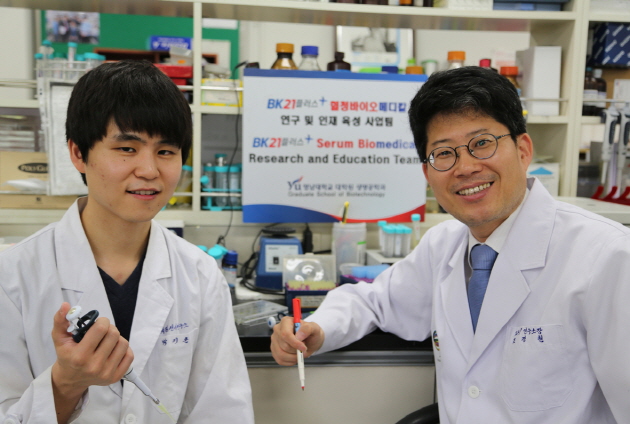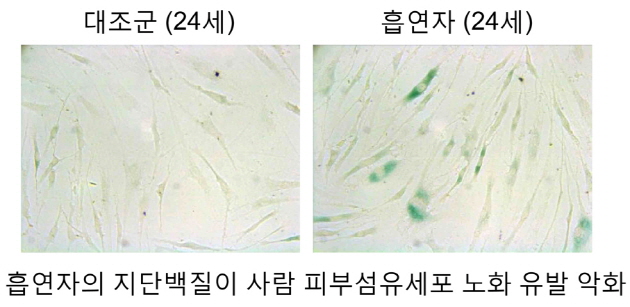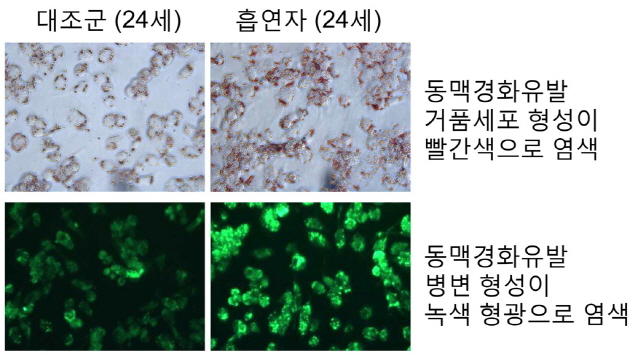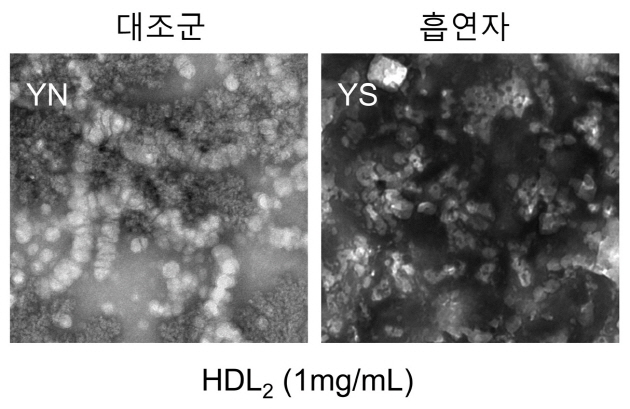Professor Cho Gyeong-hyeon’s research team(School of Biotechnology) presents scientific evidence on 'Skin Aging accelerated by Smoking' for the first time in the world. The team finds out that blood proteins of smoker in 20s are distorted and shrunken like ones in their 70s. The research thesis is published in international academic journal ranked top 9% in the field of toxicological sciences.
[Jun 11, 2014]

<School of Biotechnology Professor Cho Gyeong-hyeon (right) and Researcher Park Gi-hoon>
“Is it really true that smokers age faster than non-smokers? Why do smokers look older?"
The scientific answer on this was revealed for the first time by a research team at a Korean university.
School of Biotechnology Professor Cho Gyeong-hyeon (45) (BK21 Plus Blood Serum Bio Medical Project Team Director) and his research team announced their research results that scientifically proved that transformation of high density lipoprotein (HDL) of smokers progressed similar to that which occur in the blood serum of the elderly in their 70s, and thus such HDL transformation accelerated aging of skin cells.
Such research results were published in the May 2014 issue of the international academic journal <Toxicological Sciences> (impact factor (IF) 4.328), which is in the top 9% in the toxicology field. Furthermore, the 'smoking assessment method using lipoprotein' to identify smokers and the amount of smoking developed during the course of this study was applied for a patent in August of last year.

<Old cell dyed in green (photo on right)>
Professor Cho's research team that conducted this study for two years as part of the YU school fund support project made comparative analyses on the blood serum proteins of smokers and non-smokers in their 20s to scientifically explain the correlation of smoking and skin aging. Upon making tests on 20 smokers of the age of 24 who smoked less than 10 cigarettes a day for at least three years and 20 non-smokers of the same age, it was found that there was considerably higher oxidation and saccharification in all lipoproteins of smokers.
In particular, despite the smokers being in their early 20s, there was a large decrease in HDL, which maintains youth and health in blood serum protein, while the size of cholesterol within the HDL also decreased considerably. Furthermore, it was discovered that a core protein (apoA-I protein) that makes up HDL was broken and transformed. Such transformation was found to be at similar levels as that of the blood serum of senior citizens in their 70s.

In order to examine the effects of the HDL transformation within the blood serum of smokers on the skin cells of people, the research team treated the skin fiber cell with concentrations equal to the oxidation and saccharification that occurs in the lipoproteins of smokers. In result, it was confirmed that the HDL of smokers accelerated skin cell aging. In addition, because the transformed HDL due to smoking lost its true functions, the research team found that there was higher potential for vascular metabolism diseases such as atherosclerosis and diabetes.

<HDL of smokers (right) and non-smokers observed through an electron microscope>
On such research results, Professor Cho Gyeong-hyeon said, "Not only for the so-called 'chain smokers', but by smoking just ten cigarettes a day for three years, this shows that transformation of blood serum proteins like that of an elderly in their 70s occurs," and added, "This shows that smoking even a small amount can increase risks of vascular metabolism diseases such as diabetes, Alzheimer's and myocardial infarction, in addition to the promoting of skin aging. We are also planning to conduct research on damages to second-hand smokers."
Meanwhile, the primary author of this paper is researcher Park Gi-hoon (25), one of the first students of the YU School of Biotechnology, who is currently in a combined master's and PhD program (7th). When he was a senior as an undergraduate in December 2008, he made news by publishing a thesis as the primary author in an SCI-level international academic journal and accrued expertise through the undergraduate and graduate school programs at the YU School of Biotechnology for the past decade. His advisor, Professor Cho Gyeong-hyeon said, "I would like to thank Gi-hoon and the other researchers who proved that the location you are in cannot hold you back."













